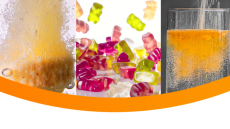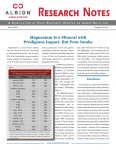Research partnership, distribution agreement to boost selenium uptake, supplier says

"We believe Cypress Systems’ rich history with ‘Gold Standard’ clinical research, coupled with the market leadership of AIDP, will make a powerful team in which the industry can place their full confidence,” Willis told NutraIngredients-USA.
Under the agreement, AIDP will represent Cypress’s full line of ingredients, which includes SelenoExcell, Chromium GTF Excell and the NutraFeast line of nutritional yeast products. The new partnership will help Cypress take advantage of what Willis said is a widening market for the element, which he said is boosted by a clinical trial agreement with the Division of Cancer Prevention at the National Cancer Institute to use SelenoExcell as the sole intervention agent in a series of cancer prevention and health related trials.
“There is a great deal more activity,” Willis said. “The industry is looking for clinically validated ingredients, research-proven ingredients. They are looking for ingredients with GRAS status. These are the kinds of things that are valued in our industry.”
Willis said AIDP’s long history of relationships will help popularize the ingredient. It is interesting to note that both Cypress Systems and AIDP are 20 years old this year.
“Up until now we have never had master distributor relationship. AIDP is a leader in our industry in that they are committed to quality ingredients—to branded ingredients—and they have earned the respect of a significant base of customers,” he said.
Differing forms of ingredient
Selenium is supplied in various forms, both as inorganic salts such as sodium selenite and sodium selenite and bound to amino acids either alone or within yeast cells.
Selenium holds a qualified FDA health claim for its role in cancer reduction. It’s rarefied air among dietary supplement and functional food ingredients; only green tea and vitamins C and E share that distinction. The approved claims for selenium are heavily qualified; nevertheless, you can say “cancer” and “reduction” on the same label.
The market took a hit after the unblinding of the SELECT cancer trial with respect to the effects of supplementation of selenium with vitamin E. The research found no effect for this combination, but Willis said this was because the researchers used the wrong form of selenium—selenomethionine.
“Form does make a difference,” Willis said. He pointed to a more recent nine-month study showed that while both forms of selenium could boost blood levels of ingredient, only the SelenoExcell ingredient reduced markers of oxidative stress. This led the researchers to conclude that the selenium-containing proteins within the yeast ingredient are the protective factor and not the element itself.
Source:Cancer Prevention Research (Phil)
“Comparative effects of two different forms of selenium on oxidative stress biomarkers in healthy men: a randomized clinical trial.”
2014 Aug;7(8):796-804
Authors: Richie JP Jr, Das A, Calcognoatto AM, et al














